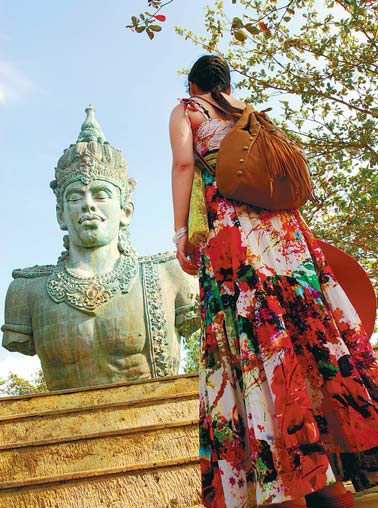More travelers from mainland going overseas
 0 Comment(s)
0 Comment(s) Print
Print E-mail China Daily, April 16, 2012
E-mail China Daily, April 16, 2012
|
A tourist visits the biggest bronze statue in Bali, Indonesia. [Peng Huan / for China Daily] |
The Chinese mainland is on its way to becoming the largest source of cross-border tourists in the world, according to a report released by the national tourism authority on Wednesday.
Experts urged overseas destinations to not solely work to take Chinese tourists' money but also to furnish more convenient and comfortable conditions to win over Chinese tourists' hearts.
The Annual Report of China Outbound Tourism Development 2012, released by the National Tourism Administration and China Tourism Academy, said mainland tourists made 70 million trips to foreign countries, as well as to Hong Kong, Macao and Taiwan last year, up 22 percent from 2010.
Jiang Yiyi, director of China Tourism Academy's International Tourism Development Institute and one of the main compilers of the report, said that was 1.2 times the number of US citizens going to foreign countries in 2011 and 3.5 times the number of Japanese citizens going abroad.
Of the 4.4 percent increase seen in cross-border tourism last year, Chinese tourists contributed 30 percent of that. That came even as the tourism industry coped with the effects of the European debt crisis, the nuclear disaster in Japan and unrest in the Middle East and North Africa, she said.
"In the near future, the world's largest source market of international trips will take shape in China," she said.
The report estimates that mainland tourists will make 78 million trips to overseas destinations this year, up 12 percent from 2011.
They are expected to spend $80 billion overseas this year, up from an estimated $69 billion last year.
The greatest part of mainland tourists' expenditures are expected to go toward shopping, accounting for 32 percent of the total. Following that is transport, taking up 21 percent of the total, the report said.
"Domestic inflation and the appreciation of the yuan against the US dollar have worked together to strengthen the yuan's purchasing power abroad," she said. "That has bolstered people's willingness to travel."
The academy's studies found that the number of overseas trips made by mainland tourists will increase by 4.36 percent if the yuan appreciates by 1 percent against the US dollar.







Go to Forum >>0 Comment(s)